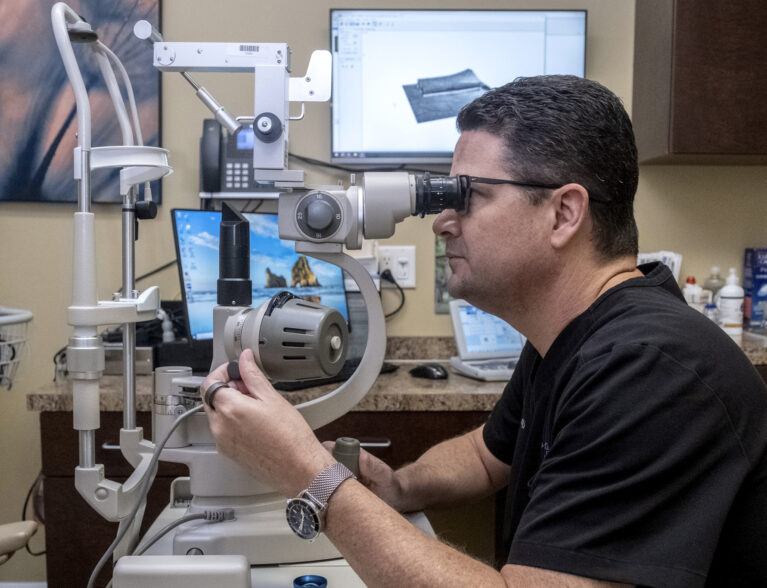
Opticians, optometrists, ophthalmologists. What’s in a name when it comes to eye care?
Who do you see for your yearly exam, surgery or simply a new pair of glasses?
Differentiating the three titles can be confusing, so we asked optometrist Dr. Brice Roselli to clarify the differences between the three O’s for eyes.
“First off, opticians are not doctors. Their sole responsibility is filling prescriptions for eyeglasses and contact lenses,” Dr. Roselli explained. “They can get a degree from a junior college or work as an apprentice to learn the trade before they can be licensed. They basically are the technicians of the vision world.
“Optometrists earn a Doctor of Optometry (OD) degree after completing their bachelor’s degree and an additional four years of optometry school. Some optometrists take their education even further with a hospital-based residency or fellowship. Their primary focus is vision care and correction. They diagnose refractive errors, prescribe eyeglasses and contact lenses, and detect and manage common eye conditions.
“Ophthalmologists are medical doctors – MDs and DOs – who graduated from medical school and completed specialized residency training in ophthalmology, which involves surgical training and the ability to diagnose and treat complex eye conditions,” Dr. Roselli continued. “They are doctors responsible for most medical and surgical management of the eye.”
There are almost 10 times as many optometrists in the U.S. as there are ophthalmologists, 166,576 compared to 18,948, according to IBISWorld.com, a reliable source of industry statistics.
A recent report by the American Optometry Association found that optometrists perform 88 million comprehensive eye exams annually, comprising 85 percent of all eye exams, compared to about 16 million exams performed by ophthalmologists.
Many ophthalmologists do prescribe and fit eyeglasses and contacts, but they typically devote more of their time to diagnosing and treating serious eye diseases, and performing eye surgery.
After medical school and advanced ophthalmological training, ophthalmologists typically specialize in specific areas such as cataracts, glaucoma, retinal conditions, pediatrics, neurology and plastic surgery.
Optometrists spend a lot of time training in the art of refraction, which determines your prescription, and are also trained to treat minor eye emergencies, such as removing a foreign substance from the eye and detecting asymptomatic eye diseases.
“Both optometrists and ophthalmologists can diagnose and treat eye diseases with over-the-counter glasses, drops, and pills as well as perform minor surgical procedures like removing foreign bodies,” Dr. Roselli said. “Both can do those procedures and have the same equipment. They are also held to the same standards by insurances.”
Dr. Roselli said that common eye problems he sees in his practice include eye infections, foreign bodies, abrasions of the eye and floaters.
When you see floaters, you should contact an optometrist or ophthalmologist immediately.
Floaters occur when the jelly inside the eye starts to break up with age, and if untreated can lead to a tear in retina or a detached retina.
While some patients go to ophthalmologists as the result of referrals from optometrists, you can make an appointment with an ophthalmologist directly if you would prefer to have your eye care provided by a medical doctor.
While optometry and ophthalmology differ in their education, scope of practice and surgical capabilities, both professions work to preserve and enhance vision and eye health.
“In my opinion, eye emergencies should be seen by an eye doctor rather than a walk-in clinic or an emergency room,” Dr. Roselli said. “ER physicians are not [always] equipped or trained in eye disease and they may not have the [needed] equipment available to them.”
Dr. Brice Roselli earned his Doctor of Optometry at Nova Southeastern University College and served an internship at Bascom Palmer Eye Institute. He then completed a residency in advanced ocular disease management and geriatrics at the Baltimore VA Medical Center in Maryland where he did rotations at the John Hopkins Wilmer Eye Institute. He is the owner of Treasure Coast Eye Associates located at 333 17th St., Suite G, Vero Beach. You can call 772-978-0845 to schedule an appointment.



